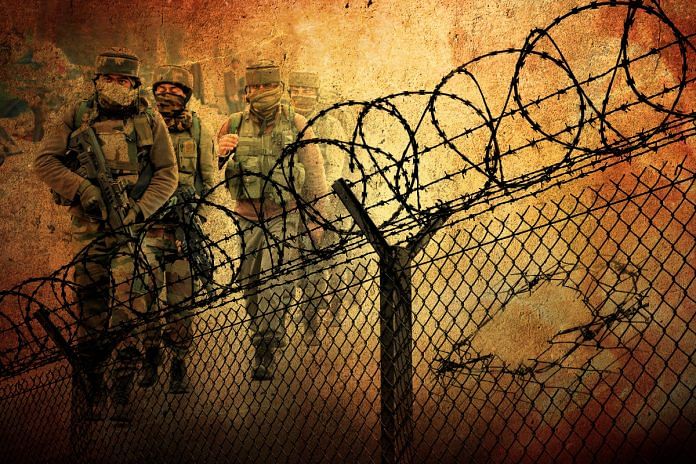A committee formed after Pathankot and Uri attacks gave a detailed plan to overhaul perimeter security in almost all military locations.
Bad fences can trigger worse consequences. Which is why it’s important to invest right, build well and guard effectively, because one slight breach could not only cause trouble, but also set off political alarm bells way more difficult to control.
The Sunjuwan military camp is that sort of a site of provocation today. A half-broken wall for a fence and a nearby drain doesn’t quite make it adequate. But the larger worry is the habitation around the camp, which has grown and spread like it happens around urban centres across the country — in this case, Jammu.
Initial investigations suggest that the five terrorists housed themselves in one such dwelling around the camp, scoped it for days and then chose to attack the spot from where they could access unarmed inhabitants in the family quarters. In 2003, terrorists gained access into soldiers’ barracks by cutting through barbed wire. At least 12 unarmed soldiers were killed.
The assumption so far is that this batch of about five terrorists may have initially planned on targets in Udhampur — the Northern Army Command headquarters or the J&K police training academy — but probably changed their mind after surveying the area.
Sunjuwan, just on the outskirts of Jammu, was clearly a more accessible option. And so, a plan quite like the way in Pathankot was crafted and executed. A quick reaction team responded but it couldn’t contain initial damage. Still, it was able to corner three of the terrorists, who were later killed in the combat that ensued.
The issue here is that the terrorists gained access despite all the efforts to conceptually and technologically recast perimeter security after the Pathankot and Uri attacks. The committee formed under Lt. Gen. Philip Campose after these attacks gave a detailed plan to overhaul perimeter security in almost all military locations in Jammu & Kashmir, including Sunjuwan.
The reason for this exercise was to ensure that an unguarded fence doesn’t become the reason to escalate to bigger military action. Uri led to the surgical strikes and now, the Sunjuwan incident will necessitate retaliation. And while that’s where the attention may be for now, the question around the fence cannot go unattended.
The Army says there’s a notification that no construction can come up within 50 metres of the fence or the boundary wall. And beyond that until about 100 metres, one cannot build a structure more than 3 metres tall. That would barely be a single-floor home.
Dwelling around Sunjuwan ostensibly stands in violation of all these norms. Yet, it’s a fact that with increasing urbanisation, the city will sprawl, dwellings and colonies will come up. And yes, some will be expedited through political patronage and with complete disregard for security concerns.
The problem is that many military bases, camps and cantonments can no longer be green zones outside city limits like they used to be at one time. The city has not only reached them, but grown around and gone beyond. This is the story in every growing urban centre with military encampments.
So, what should be done? The Campose panel suggested that perimeter security begins with quality local intelligence gathering, smart technology for fence-management and then, of course, ensuring quick response.
The report visualised a sort of a no man’s land between the boundary and the inner fence. The idea was that in case there was a breach, the response mechanism should be good enough to neutralise the intruders in this strip between the first and second layers of the perimeter.
Now, this may not be physically possible in several military locations across cities like Jammu and Pathankot, unless the military reviews its own layout, perhaps even cut some corners, reorganise its camps to create such a stretch of no man’s land. This, it appears, is now vital to protect vulnerable areas within military cantonments.
Urbanisation does necessitate optimum use of available land. And so, to mitigate security concerns in urbanising locales like Sunjuwan, the government will have to look at smart technologies to detect perimeter intrusion and at the same time, overcome space constraints.
After 26/11, the Navy and Coastguard acquired intrusion detection systems to detect unidentified fishing vessels making their way into Indian waters. The Army did study these upgrades after the Pathankot and Uri incidents.
This will have to be looked at more closely after the attack on the Sunjuwan camp. Smart technology provides better options to make fences more effective, than just old-school territory-based approaches. An ideal mix of both, alongside better local intelligence gathering, is now a must to prevent such attacks.
In the bigger picture, a fresh conversation with local urban authorities and state governments on a new security matrix for military installations in urban spaces must be initiated on an urgent basis.
This is today a security priority because every such attack will be a provocation for retaliatory action. It’s important to note that the nature of political and military response depends a lot on the number of casualties and the scale of damage.
An efficient perimeter security system, even if breached, can ensure minimal or no casualties. Which is why it’s important not to delay, else another Sunjuwan may just be round the corner.
In other words, the political consequences of lapses in perimeter security are very high. Hence, it’s about time to adopt a zero-tolerance approach on the fence, one which is smart and congruent with times, yet more effective than the past.




India should feed their soldiers and come down hard on corruption in Army. All the retired armed forces leaders are multimillionaires
Fences won’t fix the security. But regular daal roti to the poor soldiers who are under or badly equipped and trained will help improve their working.